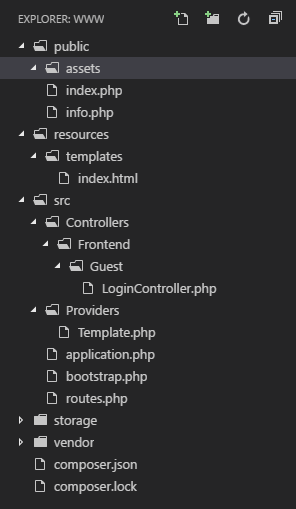I've created a base structure for my project and found a way to wire classes together, I create an array of previously loaded classes and call them from the cache. I then have a static class that holds the cache and I call the static class when I need a class.
I feel that there is a much better way to do this, and maybe I'm doing something extremely wrong? How do other PHP applications do this? I'm pretty new to it, so I was wondering if anyone could advise me towards a better way to do this? It feels like it could be hugely improved.
Current directory structure:
The static class, I use this to get my classes (providers, I call them):
<?php declare(strict_types = 1);
namespace App;
class App {
private static $providers = array();
public static function getProvider($provider) {
if (!isset(self::$providers[$provider])) {
$providerName = 'App\Providers\\' . $provider;
self::$providers[$provider] = new $providerName();
}
return self::$providers[$provider];
}
}
Example of how I use it, I do this in all my controllers to show a view:
<?php declare(strict_types = 1);
use App\App;
namespace App\Controllers\Frontend\Guest;
class LoginController
{
public function getView()
{
\App\App::getProvider('Template')->renderTemplate('index.html');
}
}
Here is one of my few providers:
<?php declare(strict_types = 1);
namespace App\Providers;
class Template {
private $twig;
public function __construct() {
$this->twig = new \Twig_Environment(new \Twig_Loader_Filesystem(ROOT . '/resources/templates'), array(
'cache' => ROOT . '/storage/cache/templates',
));
}
public function renderTemplate($template) {
echo $this->twig->render($template, array('the' => 'variables', 'go' => 'here'));
}
}

